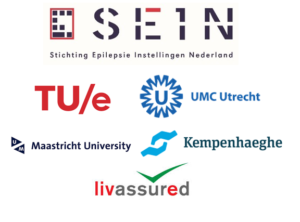NightWatch
Epilepsy impacts approximately 180.000 people in the Netherlands. One third of those continue to have seizures, despite advances in treatment. Seizures adversely affect quality of life of people with epilepsy and their caregivers. They are unpredictable, may cause loss of control and can cause life threatening situations, including injuries, status epilepticus and sudden unexpected death in epilepsy (SUDEP). Nocturnal seizures in particular can be very dangerous, as they are often unwitnessed.
People with epilepsy and their families emphasize the need for seizure detection devices which can alarm for nocturnal seizures. A reliable device can contribute to a better night’s rest, less stress and anxiety, and will eventually improve quality of life in people with epilepsy and their caregivers.
The Dutch TeleEpilepsy Consoritum is initiated in response to this pronounced need. It’s an interdisciplinary collaboration between epilepsy care facilities, academic centers, patient representatives and external companies. The consortium brings together neurologists, neurophysiologists, physicists, engineers, implementation specialists, ethicists and patient groups. The aim of this collaboration is to develop suitable seizure detection devices by engaging perspectives of all different stakeholders.
NightWatch is our very first product. It is a bracelet, worn around the upper arm at night, which alarms for potentially dangerous nocturnal seizures, so caregiver can offer help when needed and hereby prevent complications. Recently, results of good performance of NightWatch in adults living in residential care facilities was published in ‘Neurology’, a top-ranking international clinical journal. The device also caught attention in Dutch media (NOS and Nieuwsuur) as a promising and possibly life saving device.
The TeleEpilepsy Consortium also started the validation of remote seizure detection, by means of video and audio algorithms. Alike NightWatch, the validation results have been published internationally.
NightWatch is ready for implementation in residential care facilities, hospitals or at the homes of people with epilepsy. The very first devices have been produced following a successful crowdfunding campaign. NightWatch may help to reduce stress and anxiety and improve the care during the night. Eventually, we expect this to reduce medical consumption and costs.
We now conduct a prospective home-based trial in children to validate this assumption and to examine NightWatch performance. We also critically appraise the experiences of NightWatch implementation and the effect of NightWatch on parental stress, sleep, quality of life and medical consumption. This trial will enable us to calculate cost-effectiveness of NightWatch and provide important information for the negotiations with insurance companies. Reimbursement of NightWatch will be a critical step to accelerate implementation on a broader scale.
The Dutch TeleEpilepsy Consortium is continuously evaluating their initiatives. All members of the team are incorporated in the appraisal of the developmental and implementation processes and all contribute to our ultimate ambition: to create a better health care system for people with epilepsy and their caregivers.

